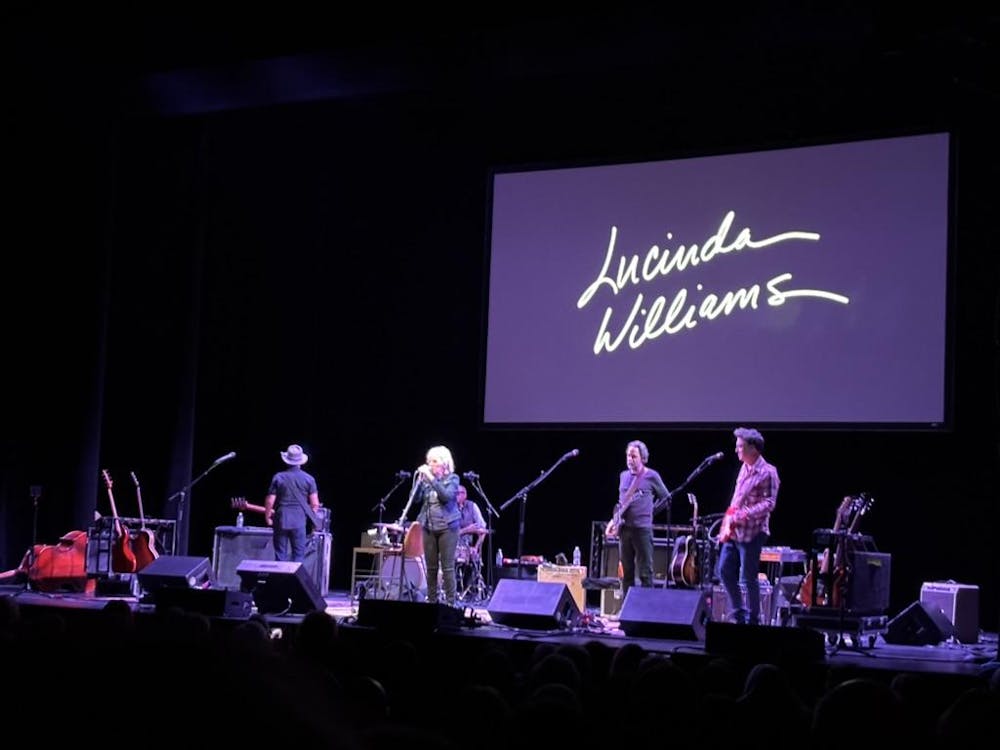As I shook the rain off of my jacket and got out my concert ticket in the warm, inviting lobby of the Matthews Theater at McCarter, I glanced around, noticing that I appeared to be one of the only people under 60-years-old in attendance. We were all here to see famed singer-songwriter Lucinda Williams’s “Don’t Tell Anybody the Secrets I Told You” show, which combines a career-spanning setlist with stories, photos, and videos from her recent namesake memoir. Even though Williams’ impact on American music has lasted decades, it seemed like most of her audience tonight was composed of people who witnessed her initial rise to success in the 1990s. Despite this generational gap, after reading Williams’s memoir and listening to her music for the past few months, I realized that her story might be more relatable to Princeton students than I once thought.
The audience’s anticipation was palpable even before the house lights were dimmed — many were so poised to clap the second Williams came onstage, that a technician fixing a microphone was accidentally given an enthusiastic round of applause. The audience then began a rhythmic, synchronized clap, as if we were at a baseball stadium, that lasted until Williams and her band appeared from behind the curtains.
The show took much the same narrative arc as Williams’s memoir, beginning with classic folk songs that inspired her to become a musician, such as Hank Williams’s “Jambalaya (On the Bayou),” and Elizabeth Cotton’s “Freight Train.” These songs evoked a feeling of nostalgia as I remembered listening to them as a kid.
Throughout the night, Williams played many of her most well-known tracks, including the energetic “Car Wheels on a Gravel Road,” and “Drunken Angel,” as well as the more mournful, story-like “Lake Charles” and “Bus to Baton Rouge.” It’s the narrative quality of much of Williams’s music that makes it so special, although in her memoir she admitted to switching this style up as soon as she was pigeonholed into categories like “singer-songwriter” or “Americana.” Williams’s voice, like her writing style, is powerful but ever-changing, easily moving from gravelly rock to soft blues and back again within the course of a few numbers.
As the show progressed further into Williams’s career, she shared stories about trying to “make it” as a musician, moving from one city to another.
“I’m gettin’ pretty …what’s the word …” she pondered, trying to describe her feelings while moving from Texas to LA. The audience called out positive suggestions like, “awesome!” or “famous!”, anticipating a self-appraising moment, but Williams had something else in mind.
“Oh yeah, anxious!” she concluded, prompting a round of laughter. Williams’s anxieties about launching her career is something to which most students can definitely relate as we prepare to begin our own careers. I found myself nodding along as she described the rigorous artistic routine she undertook when it came to writing. It was reassuring and inspiring to see another woman intent on making a place for herself as an artist, now playing for rapt audiences and looking back on her career.
The performance was also accompanied by media projected on a large backdrop screen, which ranged from photos of Williams as a child to stock footage of blooming flowers to weird pans of Bob Dylan album covers. Although some of the home-videos and personal photos added nice touches, it was clear that the music, and words, were the main focus of the evening. Williams applied a conversational quality to breaks between songs, sharing anecdotes as her bandmates changed instruments. She remarked that she was happy that in Princeton there was enough academic support to understand her background growing up surrounded by a father, a poet and professor, and his colleagues. She was also pleasantly surprised when most people seemed to understand her references to southern cuisine and culture. “I’m in Princeton and y’all know what Boudin is!” she laughed.

Williams ended her show with a standing ovation and rollicking encore of “Joy” and a track from her new Beatles cover album, “While My Guitar Gently Weeps.” However, it was the final song of her main setlist that stuck with me, “Where the Song Will Find Me.” As one of her most recent releases, she introduced it as being about “the beauty and the power of songwriting.” I loved the lyrics, which captured the experience of searching for writing inspiration perfectly.
“I know they will find me / Like they somehow do / I know they will find me / When it’s time to,” she sang assuredly. As we wrap up the semester here at Princeton and continue to search for our songs — or poems, math equations, or research projects — that’s what you should take away from Williams’s show — as long as you keep searching, they’ll find you.
Lily Hutcheson is a member of the Class of 2028 and a contributing writer for The Prospect and a contributing constructor for the Puzzles Section.









